Clinical Supervision: Theories, Approaches, and Impact
VerifiedAdded on 2022/11/24
|9
|3533
|262
Report
AI Summary
This report provides a comprehensive evaluation of clinical supervision and case management within a healthcare context, focusing on the application of educational theories and approaches. The author reflects on their personal experiences as a supervisor, particularly within the Psychological Wellbeing Practitioner (PWP) role and the Improving Access to Psychological Therapies (IAPT) program. The report explores the challenges of shifting from a purely clinical approach to Case Management Supervision (CMS) and highlights the use of frameworks like The Newcastle Cake Stand model and the C.L.E.A.R model to enhance supervision practices. It discusses the importance of establishing a strong supervisory relationship, effective communication, and adapting to diverse environments, including working with individuals in prison settings. The author emphasizes the significance of building trust, fostering open communication, and utilizing various models and approaches to improve the quality of supervision and patient outcomes. The report also examines the role of colleagues and the impact of telephonic supervision, providing insights into overcoming challenges and implementing best practices in clinical supervision.
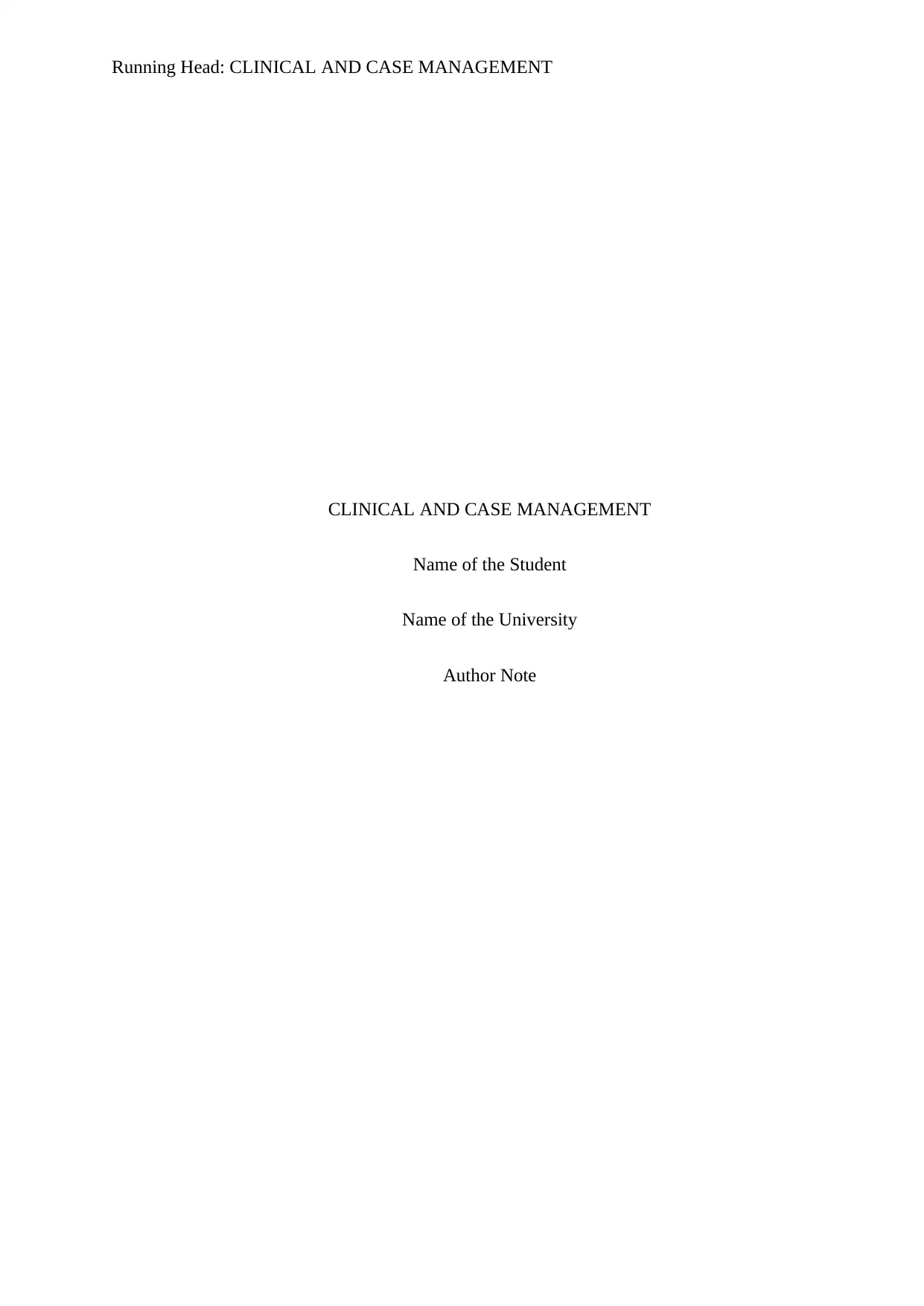
Running Head: CLINICAL AND CASE MANAGEMENT
CLINICAL AND CASE MANAGEMENT
Name of the Student
Name of the University
Author Note
CLINICAL AND CASE MANAGEMENT
Name of the Student
Name of the University
Author Note
Paraphrase This Document
Need a fresh take? Get an instant paraphrase of this document with our AI Paraphraser
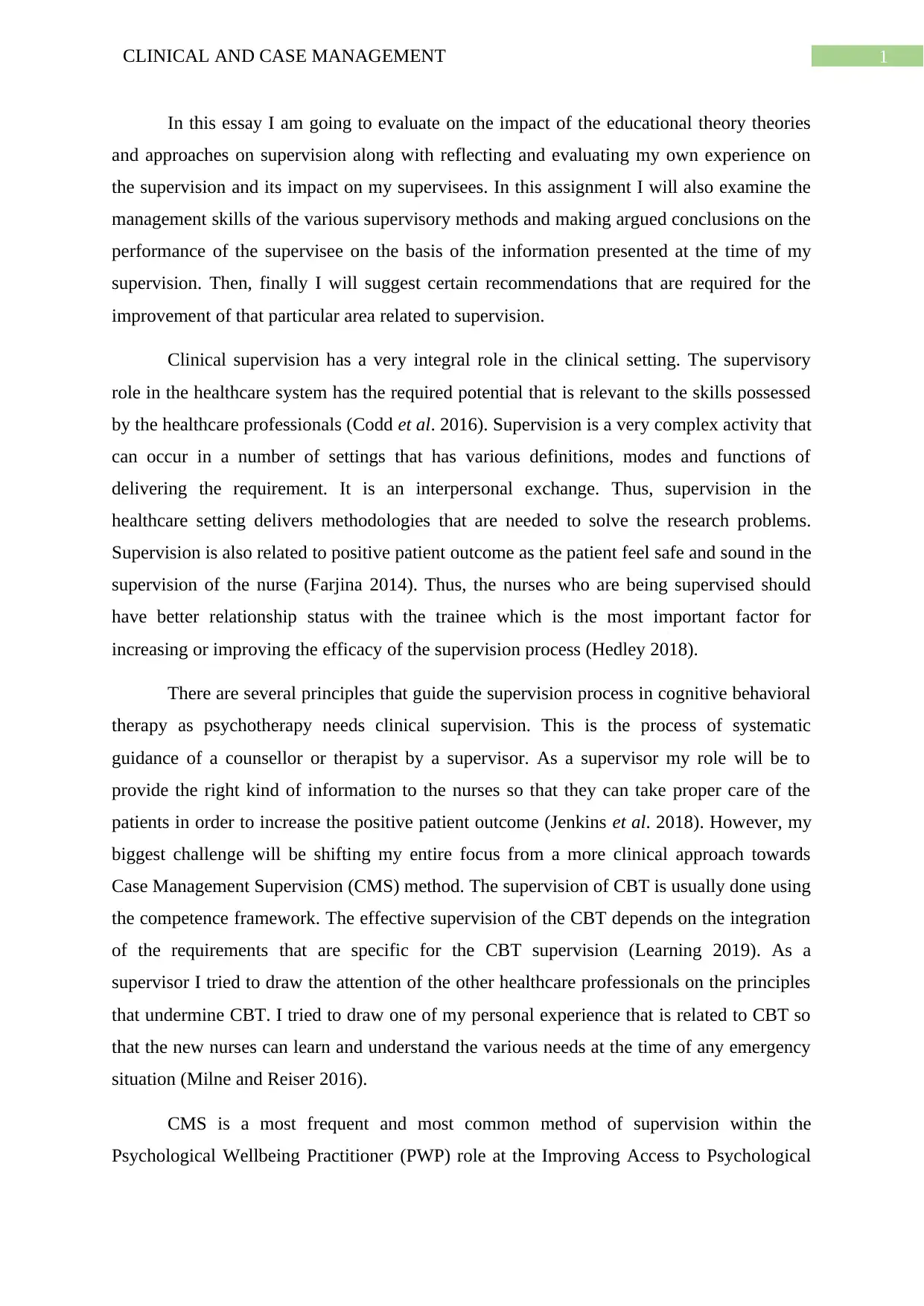
1CLINICAL AND CASE MANAGEMENT
In this essay I am going to evaluate on the impact of the educational theory theories
and approaches on supervision along with reflecting and evaluating my own experience on
the supervision and its impact on my supervisees. In this assignment I will also examine the
management skills of the various supervisory methods and making argued conclusions on the
performance of the supervisee on the basis of the information presented at the time of my
supervision. Then, finally I will suggest certain recommendations that are required for the
improvement of that particular area related to supervision.
Clinical supervision has a very integral role in the clinical setting. The supervisory
role in the healthcare system has the required potential that is relevant to the skills possessed
by the healthcare professionals (Codd et al. 2016). Supervision is a very complex activity that
can occur in a number of settings that has various definitions, modes and functions of
delivering the requirement. It is an interpersonal exchange. Thus, supervision in the
healthcare setting delivers methodologies that are needed to solve the research problems.
Supervision is also related to positive patient outcome as the patient feel safe and sound in the
supervision of the nurse (Farjina 2014). Thus, the nurses who are being supervised should
have better relationship status with the trainee which is the most important factor for
increasing or improving the efficacy of the supervision process (Hedley 2018).
There are several principles that guide the supervision process in cognitive behavioral
therapy as psychotherapy needs clinical supervision. This is the process of systematic
guidance of a counsellor or therapist by a supervisor. As a supervisor my role will be to
provide the right kind of information to the nurses so that they can take proper care of the
patients in order to increase the positive patient outcome (Jenkins et al. 2018). However, my
biggest challenge will be shifting my entire focus from a more clinical approach towards
Case Management Supervision (CMS) method. The supervision of CBT is usually done using
the competence framework. The effective supervision of the CBT depends on the integration
of the requirements that are specific for the CBT supervision (Learning 2019). As a
supervisor I tried to draw the attention of the other healthcare professionals on the principles
that undermine CBT. I tried to draw one of my personal experience that is related to CBT so
that the new nurses can learn and understand the various needs at the time of any emergency
situation (Milne and Reiser 2016).
CMS is a most frequent and most common method of supervision within the
Psychological Wellbeing Practitioner (PWP) role at the Improving Access to Psychological
In this essay I am going to evaluate on the impact of the educational theory theories
and approaches on supervision along with reflecting and evaluating my own experience on
the supervision and its impact on my supervisees. In this assignment I will also examine the
management skills of the various supervisory methods and making argued conclusions on the
performance of the supervisee on the basis of the information presented at the time of my
supervision. Then, finally I will suggest certain recommendations that are required for the
improvement of that particular area related to supervision.
Clinical supervision has a very integral role in the clinical setting. The supervisory
role in the healthcare system has the required potential that is relevant to the skills possessed
by the healthcare professionals (Codd et al. 2016). Supervision is a very complex activity that
can occur in a number of settings that has various definitions, modes and functions of
delivering the requirement. It is an interpersonal exchange. Thus, supervision in the
healthcare setting delivers methodologies that are needed to solve the research problems.
Supervision is also related to positive patient outcome as the patient feel safe and sound in the
supervision of the nurse (Farjina 2014). Thus, the nurses who are being supervised should
have better relationship status with the trainee which is the most important factor for
increasing or improving the efficacy of the supervision process (Hedley 2018).
There are several principles that guide the supervision process in cognitive behavioral
therapy as psychotherapy needs clinical supervision. This is the process of systematic
guidance of a counsellor or therapist by a supervisor. As a supervisor my role will be to
provide the right kind of information to the nurses so that they can take proper care of the
patients in order to increase the positive patient outcome (Jenkins et al. 2018). However, my
biggest challenge will be shifting my entire focus from a more clinical approach towards
Case Management Supervision (CMS) method. The supervision of CBT is usually done using
the competence framework. The effective supervision of the CBT depends on the integration
of the requirements that are specific for the CBT supervision (Learning 2019). As a
supervisor I tried to draw the attention of the other healthcare professionals on the principles
that undermine CBT. I tried to draw one of my personal experience that is related to CBT so
that the new nurses can learn and understand the various needs at the time of any emergency
situation (Milne and Reiser 2016).
CMS is a most frequent and most common method of supervision within the
Psychological Wellbeing Practitioner (PWP) role at the Improving Access to Psychological
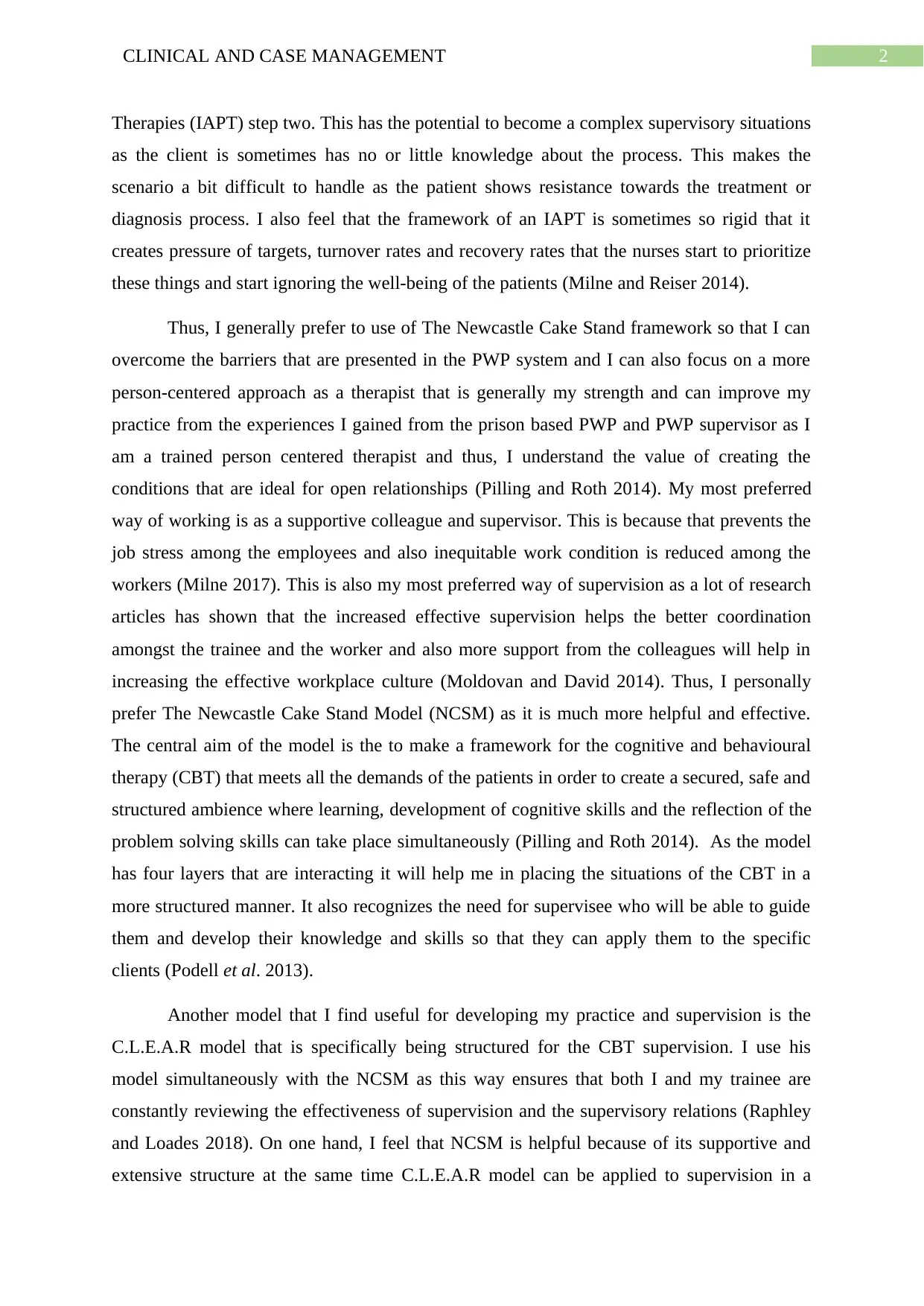
2CLINICAL AND CASE MANAGEMENT
Therapies (IAPT) step two. This has the potential to become a complex supervisory situations
as the client is sometimes has no or little knowledge about the process. This makes the
scenario a bit difficult to handle as the patient shows resistance towards the treatment or
diagnosis process. I also feel that the framework of an IAPT is sometimes so rigid that it
creates pressure of targets, turnover rates and recovery rates that the nurses start to prioritize
these things and start ignoring the well-being of the patients (Milne and Reiser 2014).
Thus, I generally prefer to use of The Newcastle Cake Stand framework so that I can
overcome the barriers that are presented in the PWP system and I can also focus on a more
person-centered approach as a therapist that is generally my strength and can improve my
practice from the experiences I gained from the prison based PWP and PWP supervisor as I
am a trained person centered therapist and thus, I understand the value of creating the
conditions that are ideal for open relationships (Pilling and Roth 2014). My most preferred
way of working is as a supportive colleague and supervisor. This is because that prevents the
job stress among the employees and also inequitable work condition is reduced among the
workers (Milne 2017). This is also my most preferred way of supervision as a lot of research
articles has shown that the increased effective supervision helps the better coordination
amongst the trainee and the worker and also more support from the colleagues will help in
increasing the effective workplace culture (Moldovan and David 2014). Thus, I personally
prefer The Newcastle Cake Stand Model (NCSM) as it is much more helpful and effective.
The central aim of the model is the to make a framework for the cognitive and behavioural
therapy (CBT) that meets all the demands of the patients in order to create a secured, safe and
structured ambience where learning, development of cognitive skills and the reflection of the
problem solving skills can take place simultaneously (Pilling and Roth 2014). As the model
has four layers that are interacting it will help me in placing the situations of the CBT in a
more structured manner. It also recognizes the need for supervisee who will be able to guide
them and develop their knowledge and skills so that they can apply them to the specific
clients (Podell et al. 2013).
Another model that I find useful for developing my practice and supervision is the
C.L.E.A.R model that is specifically being structured for the CBT supervision. I use his
model simultaneously with the NCSM as this way ensures that both I and my trainee are
constantly reviewing the effectiveness of supervision and the supervisory relations (Raphley
and Loades 2018). On one hand, I feel that NCSM is helpful because of its supportive and
extensive structure at the same time C.L.E.A.R model can be applied to supervision in a
Therapies (IAPT) step two. This has the potential to become a complex supervisory situations
as the client is sometimes has no or little knowledge about the process. This makes the
scenario a bit difficult to handle as the patient shows resistance towards the treatment or
diagnosis process. I also feel that the framework of an IAPT is sometimes so rigid that it
creates pressure of targets, turnover rates and recovery rates that the nurses start to prioritize
these things and start ignoring the well-being of the patients (Milne and Reiser 2014).
Thus, I generally prefer to use of The Newcastle Cake Stand framework so that I can
overcome the barriers that are presented in the PWP system and I can also focus on a more
person-centered approach as a therapist that is generally my strength and can improve my
practice from the experiences I gained from the prison based PWP and PWP supervisor as I
am a trained person centered therapist and thus, I understand the value of creating the
conditions that are ideal for open relationships (Pilling and Roth 2014). My most preferred
way of working is as a supportive colleague and supervisor. This is because that prevents the
job stress among the employees and also inequitable work condition is reduced among the
workers (Milne 2017). This is also my most preferred way of supervision as a lot of research
articles has shown that the increased effective supervision helps the better coordination
amongst the trainee and the worker and also more support from the colleagues will help in
increasing the effective workplace culture (Moldovan and David 2014). Thus, I personally
prefer The Newcastle Cake Stand Model (NCSM) as it is much more helpful and effective.
The central aim of the model is the to make a framework for the cognitive and behavioural
therapy (CBT) that meets all the demands of the patients in order to create a secured, safe and
structured ambience where learning, development of cognitive skills and the reflection of the
problem solving skills can take place simultaneously (Pilling and Roth 2014). As the model
has four layers that are interacting it will help me in placing the situations of the CBT in a
more structured manner. It also recognizes the need for supervisee who will be able to guide
them and develop their knowledge and skills so that they can apply them to the specific
clients (Podell et al. 2013).
Another model that I find useful for developing my practice and supervision is the
C.L.E.A.R model that is specifically being structured for the CBT supervision. I use his
model simultaneously with the NCSM as this way ensures that both I and my trainee are
constantly reviewing the effectiveness of supervision and the supervisory relations (Raphley
and Loades 2018). On one hand, I feel that NCSM is helpful because of its supportive and
extensive structure at the same time C.L.E.A.R model can be applied to supervision in a
⊘ This is a preview!⊘
Do you want full access?
Subscribe today to unlock all pages.

Trusted by 1+ million students worldwide
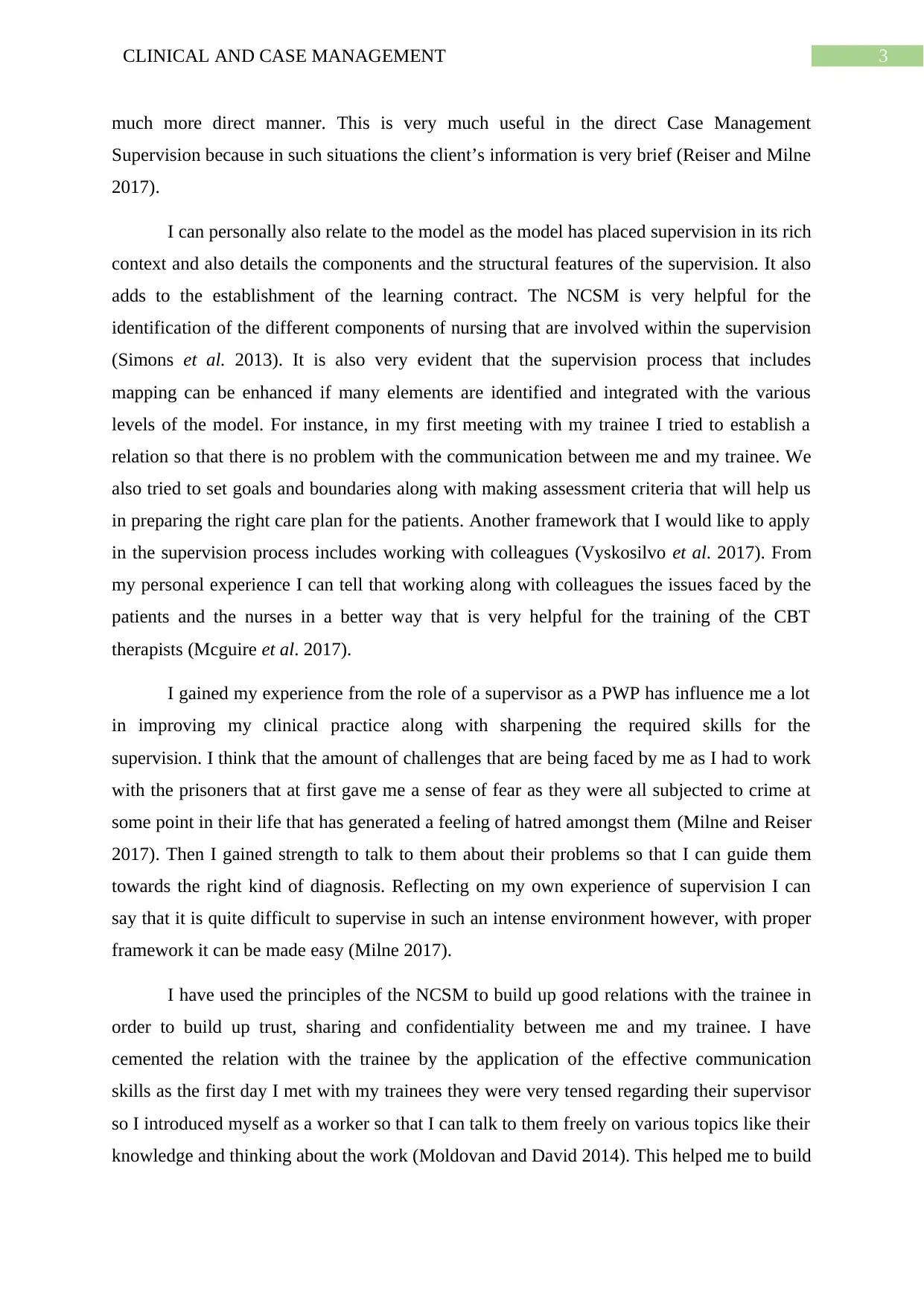
3CLINICAL AND CASE MANAGEMENT
much more direct manner. This is very much useful in the direct Case Management
Supervision because in such situations the client’s information is very brief (Reiser and Milne
2017).
I can personally also relate to the model as the model has placed supervision in its rich
context and also details the components and the structural features of the supervision. It also
adds to the establishment of the learning contract. The NCSM is very helpful for the
identification of the different components of nursing that are involved within the supervision
(Simons et al. 2013). It is also very evident that the supervision process that includes
mapping can be enhanced if many elements are identified and integrated with the various
levels of the model. For instance, in my first meeting with my trainee I tried to establish a
relation so that there is no problem with the communication between me and my trainee. We
also tried to set goals and boundaries along with making assessment criteria that will help us
in preparing the right care plan for the patients. Another framework that I would like to apply
in the supervision process includes working with colleagues (Vyskosilvo et al. 2017). From
my personal experience I can tell that working along with colleagues the issues faced by the
patients and the nurses in a better way that is very helpful for the training of the CBT
therapists (Mcguire et al. 2017).
I gained my experience from the role of a supervisor as a PWP has influence me a lot
in improving my clinical practice along with sharpening the required skills for the
supervision. I think that the amount of challenges that are being faced by me as I had to work
with the prisoners that at first gave me a sense of fear as they were all subjected to crime at
some point in their life that has generated a feeling of hatred amongst them (Milne and Reiser
2017). Then I gained strength to talk to them about their problems so that I can guide them
towards the right kind of diagnosis. Reflecting on my own experience of supervision I can
say that it is quite difficult to supervise in such an intense environment however, with proper
framework it can be made easy (Milne 2017).
I have used the principles of the NCSM to build up good relations with the trainee in
order to build up trust, sharing and confidentiality between me and my trainee. I have
cemented the relation with the trainee by the application of the effective communication
skills as the first day I met with my trainees they were very tensed regarding their supervisor
so I introduced myself as a worker so that I can talk to them freely on various topics like their
knowledge and thinking about the work (Moldovan and David 2014). This helped me to build
much more direct manner. This is very much useful in the direct Case Management
Supervision because in such situations the client’s information is very brief (Reiser and Milne
2017).
I can personally also relate to the model as the model has placed supervision in its rich
context and also details the components and the structural features of the supervision. It also
adds to the establishment of the learning contract. The NCSM is very helpful for the
identification of the different components of nursing that are involved within the supervision
(Simons et al. 2013). It is also very evident that the supervision process that includes
mapping can be enhanced if many elements are identified and integrated with the various
levels of the model. For instance, in my first meeting with my trainee I tried to establish a
relation so that there is no problem with the communication between me and my trainee. We
also tried to set goals and boundaries along with making assessment criteria that will help us
in preparing the right care plan for the patients. Another framework that I would like to apply
in the supervision process includes working with colleagues (Vyskosilvo et al. 2017). From
my personal experience I can tell that working along with colleagues the issues faced by the
patients and the nurses in a better way that is very helpful for the training of the CBT
therapists (Mcguire et al. 2017).
I gained my experience from the role of a supervisor as a PWP has influence me a lot
in improving my clinical practice along with sharpening the required skills for the
supervision. I think that the amount of challenges that are being faced by me as I had to work
with the prisoners that at first gave me a sense of fear as they were all subjected to crime at
some point in their life that has generated a feeling of hatred amongst them (Milne and Reiser
2017). Then I gained strength to talk to them about their problems so that I can guide them
towards the right kind of diagnosis. Reflecting on my own experience of supervision I can
say that it is quite difficult to supervise in such an intense environment however, with proper
framework it can be made easy (Milne 2017).
I have used the principles of the NCSM to build up good relations with the trainee in
order to build up trust, sharing and confidentiality between me and my trainee. I have
cemented the relation with the trainee by the application of the effective communication
skills as the first day I met with my trainees they were very tensed regarding their supervisor
so I introduced myself as a worker so that I can talk to them freely on various topics like their
knowledge and thinking about the work (Moldovan and David 2014). This helped me to build
Paraphrase This Document
Need a fresh take? Get an instant paraphrase of this document with our AI Paraphraser
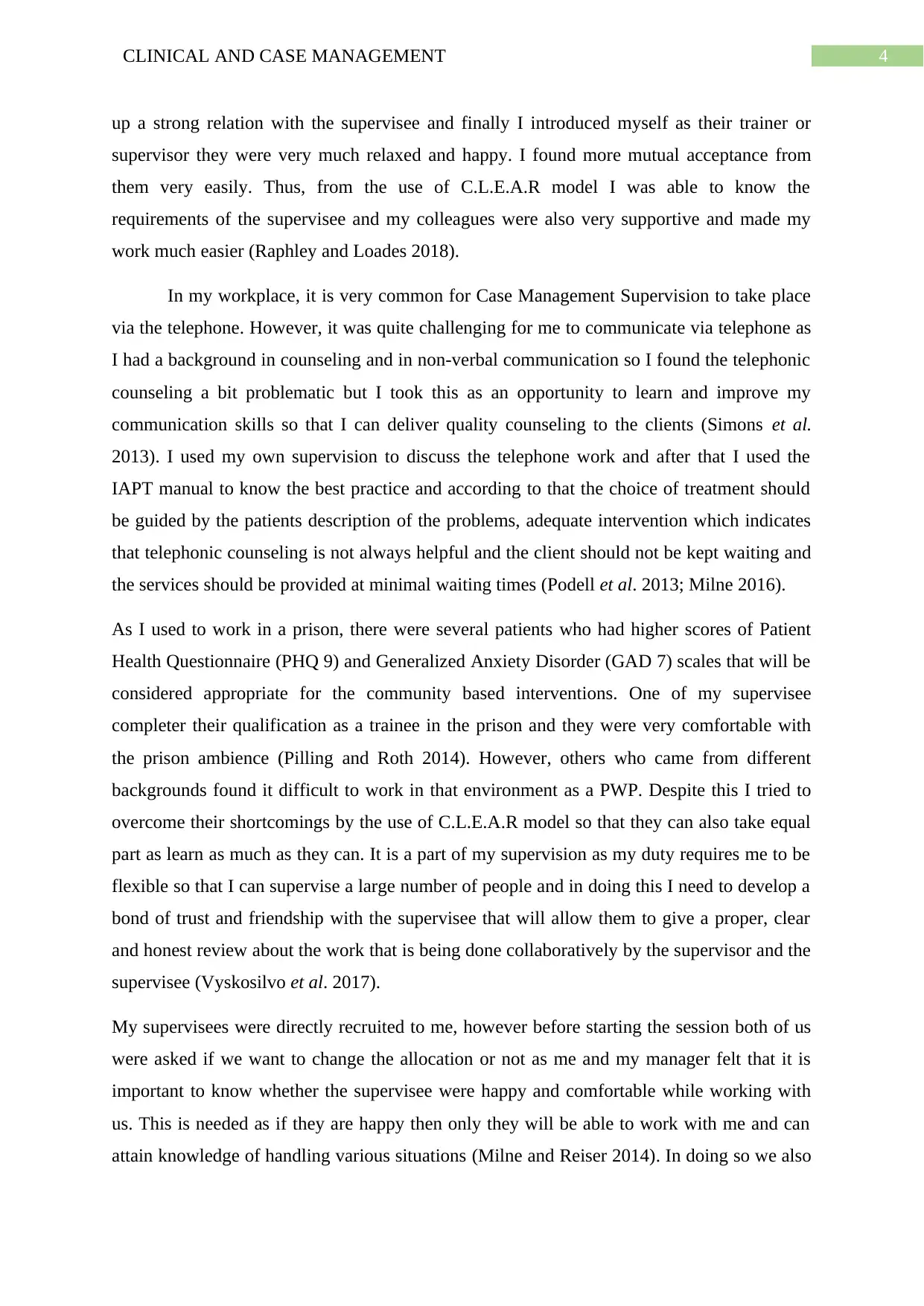
4CLINICAL AND CASE MANAGEMENT
up a strong relation with the supervisee and finally I introduced myself as their trainer or
supervisor they were very much relaxed and happy. I found more mutual acceptance from
them very easily. Thus, from the use of C.L.E.A.R model I was able to know the
requirements of the supervisee and my colleagues were also very supportive and made my
work much easier (Raphley and Loades 2018).
In my workplace, it is very common for Case Management Supervision to take place
via the telephone. However, it was quite challenging for me to communicate via telephone as
I had a background in counseling and in non-verbal communication so I found the telephonic
counseling a bit problematic but I took this as an opportunity to learn and improve my
communication skills so that I can deliver quality counseling to the clients (Simons et al.
2013). I used my own supervision to discuss the telephone work and after that I used the
IAPT manual to know the best practice and according to that the choice of treatment should
be guided by the patients description of the problems, adequate intervention which indicates
that telephonic counseling is not always helpful and the client should not be kept waiting and
the services should be provided at minimal waiting times (Podell et al. 2013; Milne 2016).
As I used to work in a prison, there were several patients who had higher scores of Patient
Health Questionnaire (PHQ 9) and Generalized Anxiety Disorder (GAD 7) scales that will be
considered appropriate for the community based interventions. One of my supervisee
completer their qualification as a trainee in the prison and they were very comfortable with
the prison ambience (Pilling and Roth 2014). However, others who came from different
backgrounds found it difficult to work in that environment as a PWP. Despite this I tried to
overcome their shortcomings by the use of C.L.E.A.R model so that they can also take equal
part as learn as much as they can. It is a part of my supervision as my duty requires me to be
flexible so that I can supervise a large number of people and in doing this I need to develop a
bond of trust and friendship with the supervisee that will allow them to give a proper, clear
and honest review about the work that is being done collaboratively by the supervisor and the
supervisee (Vyskosilvo et al. 2017).
My supervisees were directly recruited to me, however before starting the session both of us
were asked if we want to change the allocation or not as me and my manager felt that it is
important to know whether the supervisee were happy and comfortable while working with
us. This is needed as if they are happy then only they will be able to work with me and can
attain knowledge of handling various situations (Milne and Reiser 2014). In doing so we also
up a strong relation with the supervisee and finally I introduced myself as their trainer or
supervisor they were very much relaxed and happy. I found more mutual acceptance from
them very easily. Thus, from the use of C.L.E.A.R model I was able to know the
requirements of the supervisee and my colleagues were also very supportive and made my
work much easier (Raphley and Loades 2018).
In my workplace, it is very common for Case Management Supervision to take place
via the telephone. However, it was quite challenging for me to communicate via telephone as
I had a background in counseling and in non-verbal communication so I found the telephonic
counseling a bit problematic but I took this as an opportunity to learn and improve my
communication skills so that I can deliver quality counseling to the clients (Simons et al.
2013). I used my own supervision to discuss the telephone work and after that I used the
IAPT manual to know the best practice and according to that the choice of treatment should
be guided by the patients description of the problems, adequate intervention which indicates
that telephonic counseling is not always helpful and the client should not be kept waiting and
the services should be provided at minimal waiting times (Podell et al. 2013; Milne 2016).
As I used to work in a prison, there were several patients who had higher scores of Patient
Health Questionnaire (PHQ 9) and Generalized Anxiety Disorder (GAD 7) scales that will be
considered appropriate for the community based interventions. One of my supervisee
completer their qualification as a trainee in the prison and they were very comfortable with
the prison ambience (Pilling and Roth 2014). However, others who came from different
backgrounds found it difficult to work in that environment as a PWP. Despite this I tried to
overcome their shortcomings by the use of C.L.E.A.R model so that they can also take equal
part as learn as much as they can. It is a part of my supervision as my duty requires me to be
flexible so that I can supervise a large number of people and in doing this I need to develop a
bond of trust and friendship with the supervisee that will allow them to give a proper, clear
and honest review about the work that is being done collaboratively by the supervisor and the
supervisee (Vyskosilvo et al. 2017).
My supervisees were directly recruited to me, however before starting the session both of us
were asked if we want to change the allocation or not as me and my manager felt that it is
important to know whether the supervisee were happy and comfortable while working with
us. This is needed as if they are happy then only they will be able to work with me and can
attain knowledge of handling various situations (Milne and Reiser 2014). In doing so we also
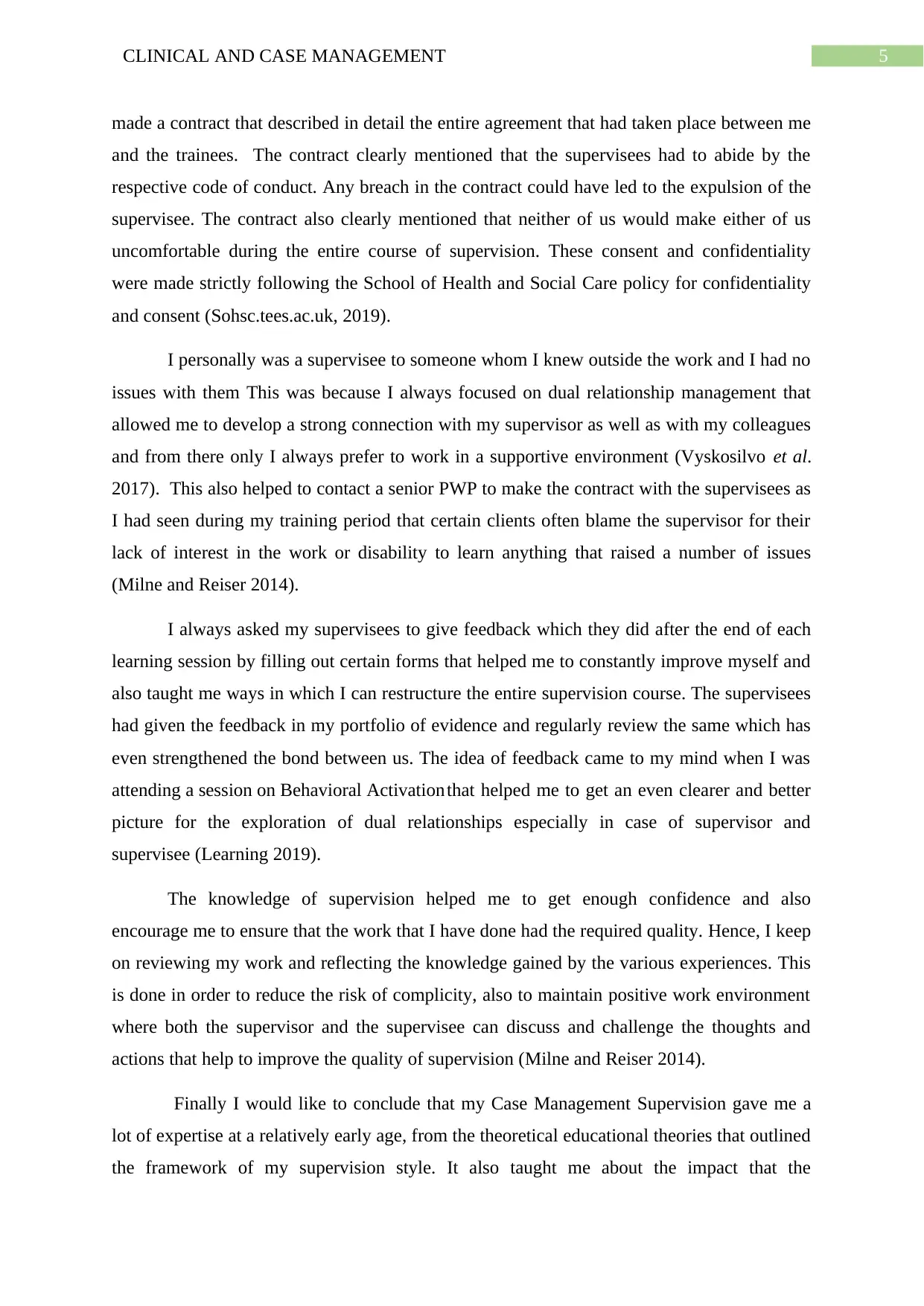
5CLINICAL AND CASE MANAGEMENT
made a contract that described in detail the entire agreement that had taken place between me
and the trainees. The contract clearly mentioned that the supervisees had to abide by the
respective code of conduct. Any breach in the contract could have led to the expulsion of the
supervisee. The contract also clearly mentioned that neither of us would make either of us
uncomfortable during the entire course of supervision. These consent and confidentiality
were made strictly following the School of Health and Social Care policy for confidentiality
and consent (Sohsc.tees.ac.uk, 2019).
I personally was a supervisee to someone whom I knew outside the work and I had no
issues with them This was because I always focused on dual relationship management that
allowed me to develop a strong connection with my supervisor as well as with my colleagues
and from there only I always prefer to work in a supportive environment (Vyskosilvo et al.
2017). This also helped to contact a senior PWP to make the contract with the supervisees as
I had seen during my training period that certain clients often blame the supervisor for their
lack of interest in the work or disability to learn anything that raised a number of issues
(Milne and Reiser 2014).
I always asked my supervisees to give feedback which they did after the end of each
learning session by filling out certain forms that helped me to constantly improve myself and
also taught me ways in which I can restructure the entire supervision course. The supervisees
had given the feedback in my portfolio of evidence and regularly review the same which has
even strengthened the bond between us. The idea of feedback came to my mind when I was
attending a session on Behavioral Activation that helped me to get an even clearer and better
picture for the exploration of dual relationships especially in case of supervisor and
supervisee (Learning 2019).
The knowledge of supervision helped me to get enough confidence and also
encourage me to ensure that the work that I have done had the required quality. Hence, I keep
on reviewing my work and reflecting the knowledge gained by the various experiences. This
is done in order to reduce the risk of complicity, also to maintain positive work environment
where both the supervisor and the supervisee can discuss and challenge the thoughts and
actions that help to improve the quality of supervision (Milne and Reiser 2014).
Finally I would like to conclude that my Case Management Supervision gave me a
lot of expertise at a relatively early age, from the theoretical educational theories that outlined
the framework of my supervision style. It also taught me about the impact that the
made a contract that described in detail the entire agreement that had taken place between me
and the trainees. The contract clearly mentioned that the supervisees had to abide by the
respective code of conduct. Any breach in the contract could have led to the expulsion of the
supervisee. The contract also clearly mentioned that neither of us would make either of us
uncomfortable during the entire course of supervision. These consent and confidentiality
were made strictly following the School of Health and Social Care policy for confidentiality
and consent (Sohsc.tees.ac.uk, 2019).
I personally was a supervisee to someone whom I knew outside the work and I had no
issues with them This was because I always focused on dual relationship management that
allowed me to develop a strong connection with my supervisor as well as with my colleagues
and from there only I always prefer to work in a supportive environment (Vyskosilvo et al.
2017). This also helped to contact a senior PWP to make the contract with the supervisees as
I had seen during my training period that certain clients often blame the supervisor for their
lack of interest in the work or disability to learn anything that raised a number of issues
(Milne and Reiser 2014).
I always asked my supervisees to give feedback which they did after the end of each
learning session by filling out certain forms that helped me to constantly improve myself and
also taught me ways in which I can restructure the entire supervision course. The supervisees
had given the feedback in my portfolio of evidence and regularly review the same which has
even strengthened the bond between us. The idea of feedback came to my mind when I was
attending a session on Behavioral Activation that helped me to get an even clearer and better
picture for the exploration of dual relationships especially in case of supervisor and
supervisee (Learning 2019).
The knowledge of supervision helped me to get enough confidence and also
encourage me to ensure that the work that I have done had the required quality. Hence, I keep
on reviewing my work and reflecting the knowledge gained by the various experiences. This
is done in order to reduce the risk of complicity, also to maintain positive work environment
where both the supervisor and the supervisee can discuss and challenge the thoughts and
actions that help to improve the quality of supervision (Milne and Reiser 2014).
Finally I would like to conclude that my Case Management Supervision gave me a
lot of expertise at a relatively early age, from the theoretical educational theories that outlined
the framework of my supervision style. It also taught me about the impact that the
⊘ This is a preview!⊘
Do you want full access?
Subscribe today to unlock all pages.

Trusted by 1+ million students worldwide
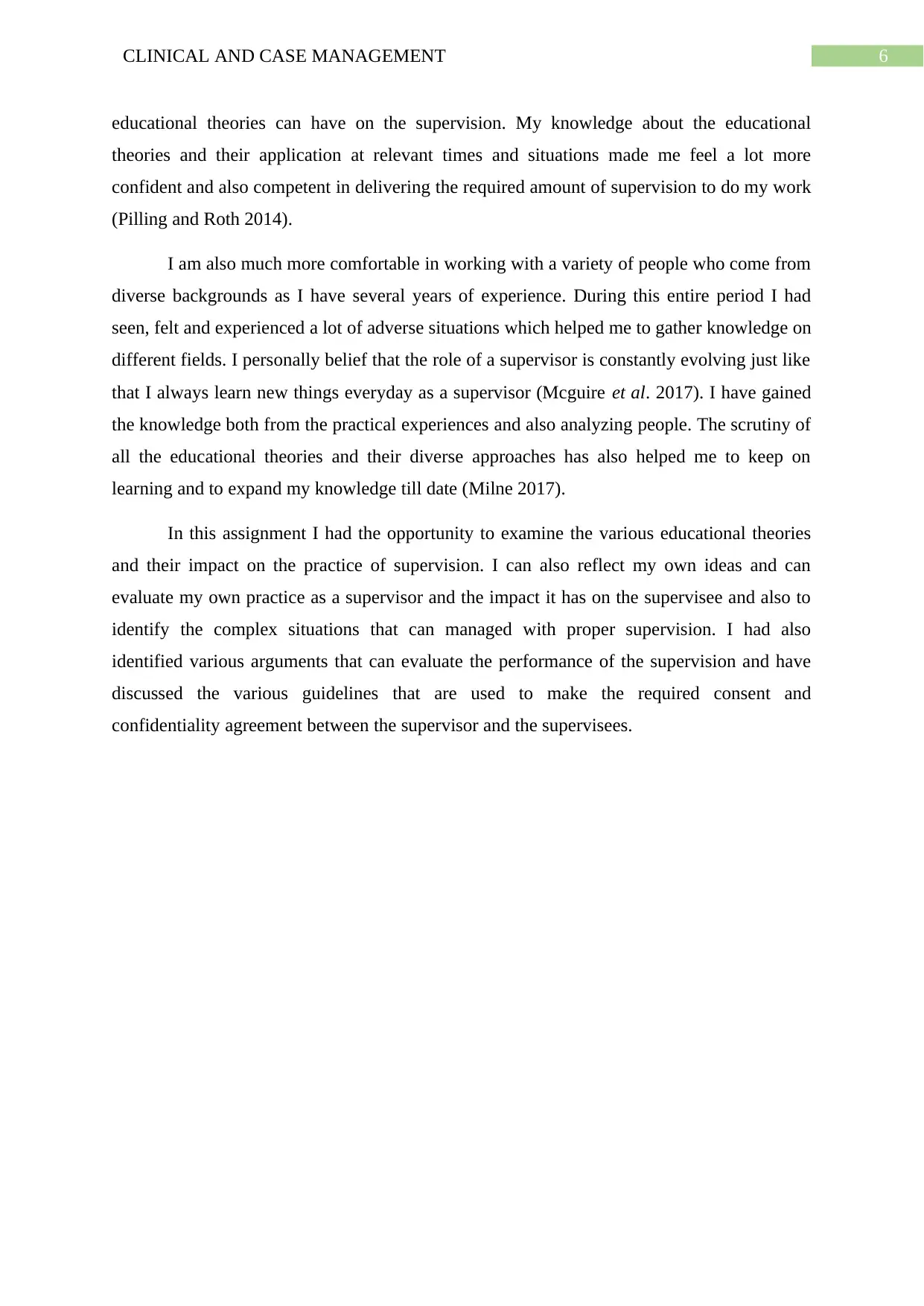
6CLINICAL AND CASE MANAGEMENT
educational theories can have on the supervision. My knowledge about the educational
theories and their application at relevant times and situations made me feel a lot more
confident and also competent in delivering the required amount of supervision to do my work
(Pilling and Roth 2014).
I am also much more comfortable in working with a variety of people who come from
diverse backgrounds as I have several years of experience. During this entire period I had
seen, felt and experienced a lot of adverse situations which helped me to gather knowledge on
different fields. I personally belief that the role of a supervisor is constantly evolving just like
that I always learn new things everyday as a supervisor (Mcguire et al. 2017). I have gained
the knowledge both from the practical experiences and also analyzing people. The scrutiny of
all the educational theories and their diverse approaches has also helped me to keep on
learning and to expand my knowledge till date (Milne 2017).
In this assignment I had the opportunity to examine the various educational theories
and their impact on the practice of supervision. I can also reflect my own ideas and can
evaluate my own practice as a supervisor and the impact it has on the supervisee and also to
identify the complex situations that can managed with proper supervision. I had also
identified various arguments that can evaluate the performance of the supervision and have
discussed the various guidelines that are used to make the required consent and
confidentiality agreement between the supervisor and the supervisees.
educational theories can have on the supervision. My knowledge about the educational
theories and their application at relevant times and situations made me feel a lot more
confident and also competent in delivering the required amount of supervision to do my work
(Pilling and Roth 2014).
I am also much more comfortable in working with a variety of people who come from
diverse backgrounds as I have several years of experience. During this entire period I had
seen, felt and experienced a lot of adverse situations which helped me to gather knowledge on
different fields. I personally belief that the role of a supervisor is constantly evolving just like
that I always learn new things everyday as a supervisor (Mcguire et al. 2017). I have gained
the knowledge both from the practical experiences and also analyzing people. The scrutiny of
all the educational theories and their diverse approaches has also helped me to keep on
learning and to expand my knowledge till date (Milne 2017).
In this assignment I had the opportunity to examine the various educational theories
and their impact on the practice of supervision. I can also reflect my own ideas and can
evaluate my own practice as a supervisor and the impact it has on the supervisee and also to
identify the complex situations that can managed with proper supervision. I had also
identified various arguments that can evaluate the performance of the supervision and have
discussed the various guidelines that are used to make the required consent and
confidentiality agreement between the supervisor and the supervisees.
Paraphrase This Document
Need a fresh take? Get an instant paraphrase of this document with our AI Paraphraser
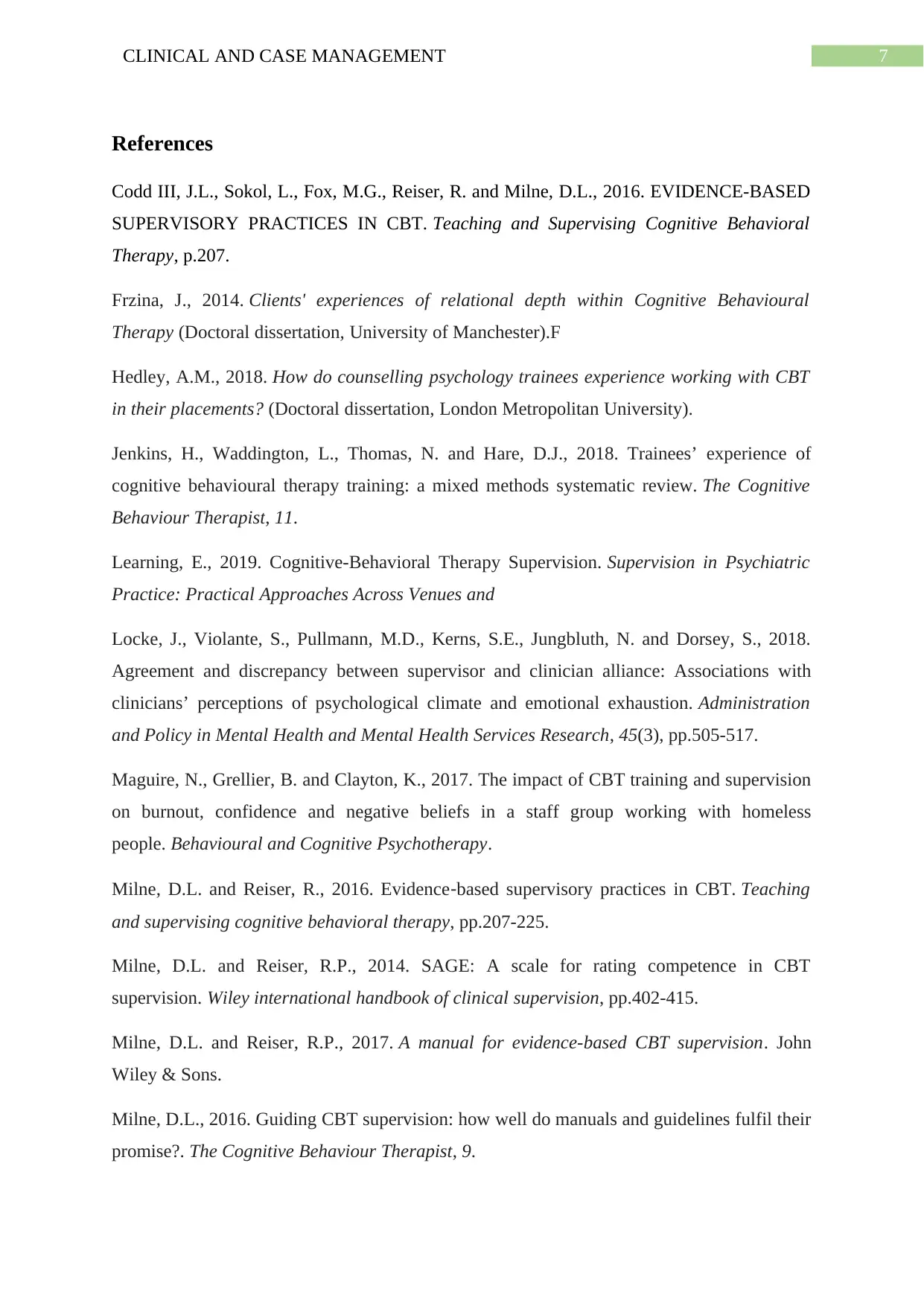
7CLINICAL AND CASE MANAGEMENT
References
Codd III, J.L., Sokol, L., Fox, M.G., Reiser, R. and Milne, D.L., 2016. EVIDENCE-BASED
SUPERVISORY PRACTICES IN CBT. Teaching and Supervising Cognitive Behavioral
Therapy, p.207.
Frzina, J., 2014. Clients' experiences of relational depth within Cognitive Behavioural
Therapy (Doctoral dissertation, University of Manchester).F
Hedley, A.M., 2018. How do counselling psychology trainees experience working with CBT
in their placements? (Doctoral dissertation, London Metropolitan University).
Jenkins, H., Waddington, L., Thomas, N. and Hare, D.J., 2018. Trainees’ experience of
cognitive behavioural therapy training: a mixed methods systematic review. The Cognitive
Behaviour Therapist, 11.
Learning, E., 2019. Cognitive-Behavioral Therapy Supervision. Supervision in Psychiatric
Practice: Practical Approaches Across Venues and
Locke, J., Violante, S., Pullmann, M.D., Kerns, S.E., Jungbluth, N. and Dorsey, S., 2018.
Agreement and discrepancy between supervisor and clinician alliance: Associations with
clinicians’ perceptions of psychological climate and emotional exhaustion. Administration
and Policy in Mental Health and Mental Health Services Research, 45(3), pp.505-517.
Maguire, N., Grellier, B. and Clayton, K., 2017. The impact of CBT training and supervision
on burnout, confidence and negative beliefs in a staff group working with homeless
people. Behavioural and Cognitive Psychotherapy.
Milne, D.L. and Reiser, R., 2016. Evidence‐based supervisory practices in CBT. Teaching
and supervising cognitive behavioral therapy, pp.207-225.
Milne, D.L. and Reiser, R.P., 2014. SAGE: A scale for rating competence in CBT
supervision. Wiley international handbook of clinical supervision, pp.402-415.
Milne, D.L. and Reiser, R.P., 2017. A manual for evidence-based CBT supervision. John
Wiley & Sons.
Milne, D.L., 2016. Guiding CBT supervision: how well do manuals and guidelines fulfil their
promise?. The Cognitive Behaviour Therapist, 9.
References
Codd III, J.L., Sokol, L., Fox, M.G., Reiser, R. and Milne, D.L., 2016. EVIDENCE-BASED
SUPERVISORY PRACTICES IN CBT. Teaching and Supervising Cognitive Behavioral
Therapy, p.207.
Frzina, J., 2014. Clients' experiences of relational depth within Cognitive Behavioural
Therapy (Doctoral dissertation, University of Manchester).F
Hedley, A.M., 2018. How do counselling psychology trainees experience working with CBT
in their placements? (Doctoral dissertation, London Metropolitan University).
Jenkins, H., Waddington, L., Thomas, N. and Hare, D.J., 2018. Trainees’ experience of
cognitive behavioural therapy training: a mixed methods systematic review. The Cognitive
Behaviour Therapist, 11.
Learning, E., 2019. Cognitive-Behavioral Therapy Supervision. Supervision in Psychiatric
Practice: Practical Approaches Across Venues and
Locke, J., Violante, S., Pullmann, M.D., Kerns, S.E., Jungbluth, N. and Dorsey, S., 2018.
Agreement and discrepancy between supervisor and clinician alliance: Associations with
clinicians’ perceptions of psychological climate and emotional exhaustion. Administration
and Policy in Mental Health and Mental Health Services Research, 45(3), pp.505-517.
Maguire, N., Grellier, B. and Clayton, K., 2017. The impact of CBT training and supervision
on burnout, confidence and negative beliefs in a staff group working with homeless
people. Behavioural and Cognitive Psychotherapy.
Milne, D.L. and Reiser, R., 2016. Evidence‐based supervisory practices in CBT. Teaching
and supervising cognitive behavioral therapy, pp.207-225.
Milne, D.L. and Reiser, R.P., 2014. SAGE: A scale for rating competence in CBT
supervision. Wiley international handbook of clinical supervision, pp.402-415.
Milne, D.L. and Reiser, R.P., 2017. A manual for evidence-based CBT supervision. John
Wiley & Sons.
Milne, D.L., 2016. Guiding CBT supervision: how well do manuals and guidelines fulfil their
promise?. The Cognitive Behaviour Therapist, 9.
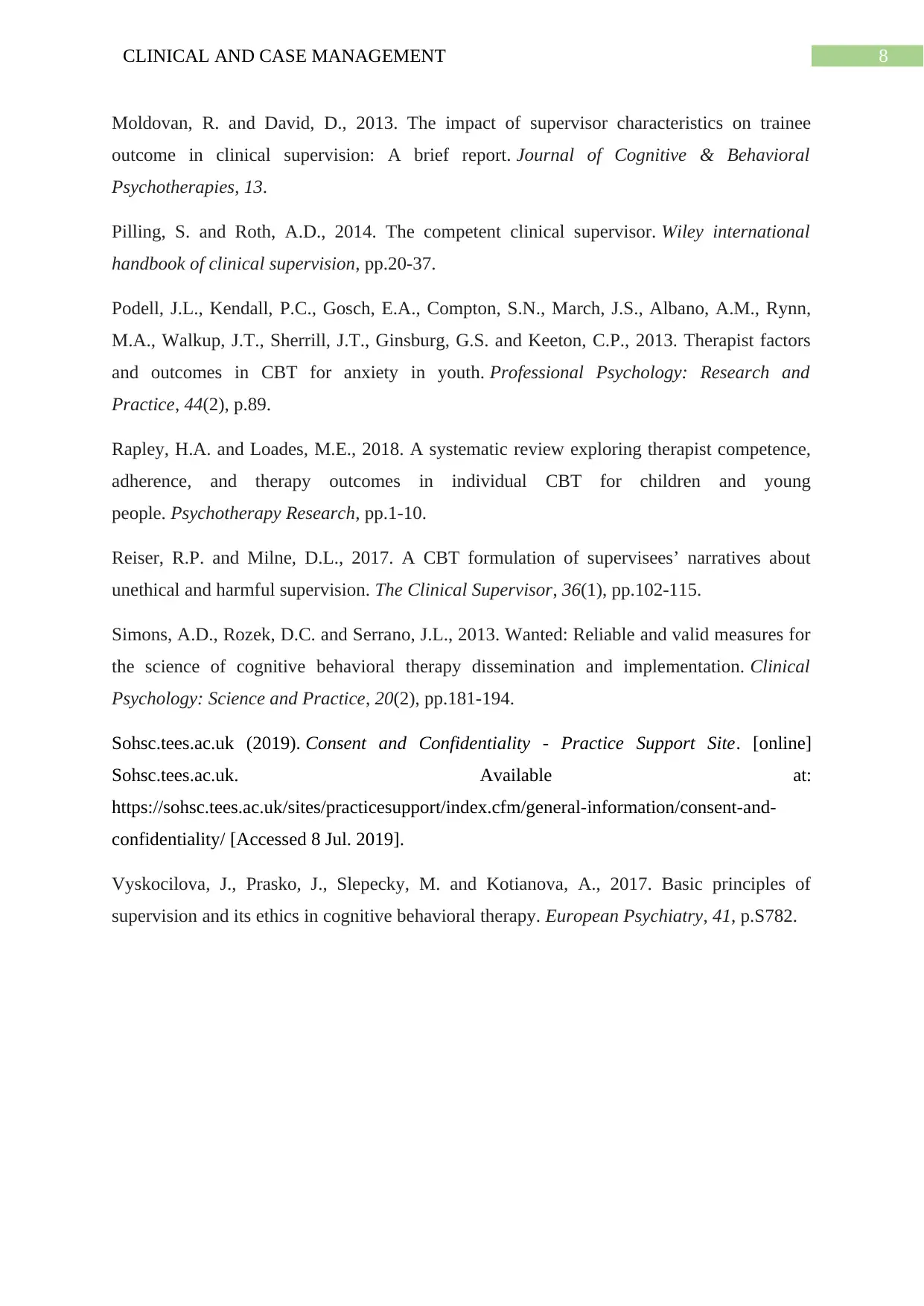
8CLINICAL AND CASE MANAGEMENT
Moldovan, R. and David, D., 2013. The impact of supervisor characteristics on trainee
outcome in clinical supervision: A brief report. Journal of Cognitive & Behavioral
Psychotherapies, 13.
Pilling, S. and Roth, A.D., 2014. The competent clinical supervisor. Wiley international
handbook of clinical supervision, pp.20-37.
Podell, J.L., Kendall, P.C., Gosch, E.A., Compton, S.N., March, J.S., Albano, A.M., Rynn,
M.A., Walkup, J.T., Sherrill, J.T., Ginsburg, G.S. and Keeton, C.P., 2013. Therapist factors
and outcomes in CBT for anxiety in youth. Professional Psychology: Research and
Practice, 44(2), p.89.
Rapley, H.A. and Loades, M.E., 2018. A systematic review exploring therapist competence,
adherence, and therapy outcomes in individual CBT for children and young
people. Psychotherapy Research, pp.1-10.
Reiser, R.P. and Milne, D.L., 2017. A CBT formulation of supervisees’ narratives about
unethical and harmful supervision. The Clinical Supervisor, 36(1), pp.102-115.
Simons, A.D., Rozek, D.C. and Serrano, J.L., 2013. Wanted: Reliable and valid measures for
the science of cognitive behavioral therapy dissemination and implementation. Clinical
Psychology: Science and Practice, 20(2), pp.181-194.
Sohsc.tees.ac.uk (2019). Consent and Confidentiality - Practice Support Site. [online]
Sohsc.tees.ac.uk. Available at:
https://sohsc.tees.ac.uk/sites/practicesupport/index.cfm/general-information/consent-and-
confidentiality/ [Accessed 8 Jul. 2019].
Vyskocilova, J., Prasko, J., Slepecky, M. and Kotianova, A., 2017. Basic principles of
supervision and its ethics in cognitive behavioral therapy. European Psychiatry, 41, p.S782.
Moldovan, R. and David, D., 2013. The impact of supervisor characteristics on trainee
outcome in clinical supervision: A brief report. Journal of Cognitive & Behavioral
Psychotherapies, 13.
Pilling, S. and Roth, A.D., 2014. The competent clinical supervisor. Wiley international
handbook of clinical supervision, pp.20-37.
Podell, J.L., Kendall, P.C., Gosch, E.A., Compton, S.N., March, J.S., Albano, A.M., Rynn,
M.A., Walkup, J.T., Sherrill, J.T., Ginsburg, G.S. and Keeton, C.P., 2013. Therapist factors
and outcomes in CBT for anxiety in youth. Professional Psychology: Research and
Practice, 44(2), p.89.
Rapley, H.A. and Loades, M.E., 2018. A systematic review exploring therapist competence,
adherence, and therapy outcomes in individual CBT for children and young
people. Psychotherapy Research, pp.1-10.
Reiser, R.P. and Milne, D.L., 2017. A CBT formulation of supervisees’ narratives about
unethical and harmful supervision. The Clinical Supervisor, 36(1), pp.102-115.
Simons, A.D., Rozek, D.C. and Serrano, J.L., 2013. Wanted: Reliable and valid measures for
the science of cognitive behavioral therapy dissemination and implementation. Clinical
Psychology: Science and Practice, 20(2), pp.181-194.
Sohsc.tees.ac.uk (2019). Consent and Confidentiality - Practice Support Site. [online]
Sohsc.tees.ac.uk. Available at:
https://sohsc.tees.ac.uk/sites/practicesupport/index.cfm/general-information/consent-and-
confidentiality/ [Accessed 8 Jul. 2019].
Vyskocilova, J., Prasko, J., Slepecky, M. and Kotianova, A., 2017. Basic principles of
supervision and its ethics in cognitive behavioral therapy. European Psychiatry, 41, p.S782.
⊘ This is a preview!⊘
Do you want full access?
Subscribe today to unlock all pages.

Trusted by 1+ million students worldwide
1 out of 9
Related Documents
Your All-in-One AI-Powered Toolkit for Academic Success.
+13062052269
info@desklib.com
Available 24*7 on WhatsApp / Email
![[object Object]](/_next/static/media/star-bottom.7253800d.svg)
Unlock your academic potential
Copyright © 2020–2025 A2Z Services. All Rights Reserved. Developed and managed by ZUCOL.





